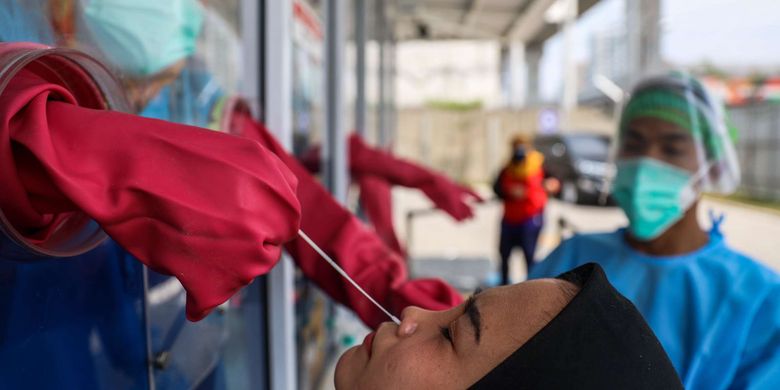KOMPAS.com – Corona virus SARS-CoV-2 has a great chance of being transmitted if we are around people who are infected with Covid-19.
What to do if you feel infected with Covid-19?
Live on tes Covid-19 is not the first thing you should do if you think you have Covid-19.
“If you feel or suspect you are infected with Covid-19, do so quarantine, “said Lisa Lee, Virginia Tech Professor and public health expert who spent 14 years working at the Centers for Disease Control and Prevention (CDC). Insider.
Also read: Prevent Covid-19 Transmission, Silk Masks Are Better Than Cotton
On average, symptoms of the disease will appear within 4-5 days after a person is infected with Covid-19. However, the incubation period corona virus can last two to 14 days.
This is why the recommended quarantine period is 14 full days.
No matter how you feel during that time or what your test results may indicate, the quarantine period remains 14 days.
To keep in mind, there is currently no approved Covid-19 vaccine and there is no reliable treatment for everyone.
Therefore, even if we show no signs of illness during the quarantine period, remember that we can still put others at risk of infection, or even death, if we are not careful.
The coronavirus can also spread easily from asymptomatic people who show no signs of disease.
According to current CDC estimates, asymptomatic transmission can account for up to 40 percent of all coronavirus cases.
So, it is important for everyone to stay at home when they feel exposed to the corona virus, even though they feel fine.
Here are three things to do during quarantine Science Alert, Saturday (10/10/2020).
1. Best time of test
After you quarantine it, the best time to get an accurate test is about a week after you’ve been exposed to the virus.
The Minnesota Department of Health recommends testing five to seven days after the event of exposure.
If the first test comes back negative, it’s a good idea to get tested again about 12 days after the initial event. The reason is, this virus does take several days to be identified.
It is also important to note that the hidden period before symptoms appear or the so-called pre-symptom period is the time when people transmit the corona virus most often. This is partly because infected people do not know they have been exposed to Covid-19.
This pre-symptom spread problem is one of the reasons why the corona virus pandemic is difficult to eradicate.
Often, the day before symptoms appear is when people pass their infection on to others in the best possible way.
So avoid crowds, wear a mask if you have to be around other people in the house.
The CDC recommends, If the test results are positive try to isolate yourself in a separate room and use a separate bathroom.
If you can’t live in a separate room, ensure good airflow by opening the windows so that the virus doesn’t spread in the air for long periods of time.
 Health workers using personal protective equipment (PPE) take samples using the swab test method at the GSI Lab (Genomic Solidaritas Indonesia Laboratory), Cilandak, South Jakarta, Wednesday (30/9/2020). To break the chain of transmission of Covid-19, Genomic Solidaritas Indonesia (GSI Lab) opened a PCR test laboratory with a Biosafety Level (BSL) 2+ standard.-
Health workers using personal protective equipment (PPE) take samples using the swab test method at the GSI Lab (Genomic Solidaritas Indonesia Laboratory), Cilandak, South Jakarta, Wednesday (30/9/2020). To break the chain of transmission of Covid-19, Genomic Solidaritas Indonesia (GSI Lab) opened a PCR test laboratory with a Biosafety Level (BSL) 2+ standard.-
2. Lab Tests
The best test to determine your exposure to the virus is better to use laboratory tests.
The corona virus test is a nose and throat swab test that must be taken to a laboratory for results.
This is called an RT-PCR test and is looking for the presence of several genes that indicate the coronavirus.
Lee said, as long as the test is done properly, the virus in the body can be detected.
To perform this test, a doctor usually wipes deep inside a person’s nose and throat to expel phlegm, discharge through coughing, sneezing, spitting, and even speaking. Results are usually returned within a few days.
There are types of tests that are quick, because they often give results in as little as 15 minutes, without lab work. But there is a consequence of that speed: they are less precise at catching infections.
“Instead of looking for viral genetic material, he looked for small pieces in the viral layer,” Lee said.
So that the tests carried out only look for certain proteins that are outside the virus. Generally these tests are only performed for screening.
Positive test results for exposure to Covid-19 are better if confirmed by laboratory tests.
“A negative test one day doesn’t mean you will be negative the next day,” said Giroir.
Also read: There is Liquid Gel in the Lungs of Critical Covid-19 Patients, What Is It?
3. Run the test again at the end of your quarantine
When you complete quarantine, it’s a good idea to get one last test, just to help make sure it’s safe to venture back into society.
“If you want to get a test while you’re in quarantine for 14 days, fine, but you definitely need a test at the end to make sure you can get out,” Lee said.
If the test turns out to be positive for Covid-19, talk to your health care provider about how long it will take you to be tested again to make sure you are no longer infected.
“It varies for each person depending on whether they have symptoms, when they have symptoms, how long they’ve had symptoms, that sort of thing,” Lee said.
“So, this is something really important to do with health care providers.”
– .
/data/photo/2020/10/05/5f7ae609d0496.jpg)

